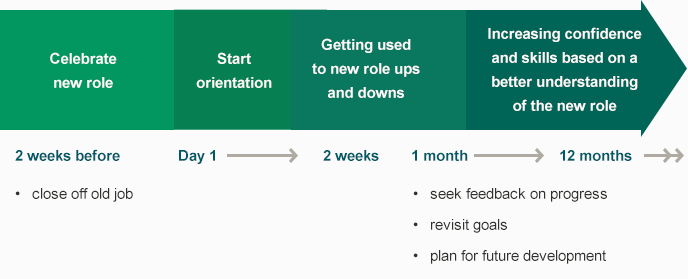As a manager in a Victorian public sector organisation, you should not underestimate the potential you have to influence staff and organisational outcomes. Your approach to managing has the potential to inspire a team to the highest standards of performance.
About the transition
Many managers find the transition from staff member to manager to be the most challenging of their career. Moving from being a team member or a technical expert, to working through others, requires a major shift in perspective. Different skills and behaviours are needed for a manager’s job.
There are also many aspects of managing in the public sector that are different to other environments. Much of the authority and accountability of public sector managers is determined by legislation specific to our sector (e.g. in relation to financial management, privacy and freedom of information).
Transition to a management role may also require a greater understanding of the functions of and relationships with other organisations within the public sector (e.g. between your organisation and the portfolio Department, or oversight bodies such as the Office of the Ombudsman).
Public sector managers will also need to be familiar with the values and employment principles outlined in the Public Administration Act 2004 (the Act), which set the core standards for behaviour and workplace relationships.
Every new role involves a learning curve: understanding what you need to do, priorities, key relationships and so forth. You may find your confidence levels fluctuating in the early days. This is all part of adapting to change. For support, you should schedule more frequent meetings with your manager in the first weeks. The following diagram shows the typical tasks of transition.
Figure 1. Sample timeline for typical transition tasks and responses
New managers can sometimes be surprised by how much of their day is now taken up with meeting others. This is because, as a manager, your primary focus has undergone a fundamental shift.
You are no longer simply accountable for what you alone produce and do; you are now accountable for the outputs and behaviour of your whole team.You will find yourself faced with various degrees of responsibility for others: their workload, development, performance and wellbeing.
Managers therefore have to combine the ability to:
- work to a high standard
- influence their team to work to a high standard
- influence other managers and external stakeholders.
You become a key communicator of organisational news and strategies for your team, who will probably prefer to receive important information from you as their direct manager, face to face. You also play a vital role in relaying information back up the management line.
Your first discussion with your new manager
You should start to understand:
- key result areas and what they expect you to achieve in the first one to six months;
- what skills and knowledge you need to develop;
- key stakeholders you will need to deal with;
- how your performance will be assessed; and
- how they would like to work with you (and you with them).
Closing off the old job and preparing for the new role
Closing off your old job helps you to focus better when you start your new role. This is particularly important if your new management role is in the same area or organisation as your previous role.
An essential part of preparing for the new role is to confirm your team’s purpose and objectives. Without this, you cannot lead your new team effectively.
Suggested activities
- Document the processes and expertise required for outstanding tasks associated with your old job, and hand over to your successor
- Discuss with your former manager how you can use your strengths in the transition to your new role
- Enrol in your organisation’s induction program – ask if there is a program specifically for new managers
- Have a discussion with your new manager
- Meet team members and discuss their experiences, work preferences and strengths, and how you might work best together
- Meet key stakeholders; understand their relationship to your team, their needs and expectations
- Find out about the extent and limitations of your ability to authorise and/or approve certain activities
- Make a written plan with your manager about how your performance will be assessed and the types of development and training opportunities you could benefit from
- Schedule dates for reviewing your transition with your manager.
Transition challenges
Whether you are an experienced manager from the private or not-for-profit sector, or a newly promoted public sector employee, there may be some specific challenges you will face during your transition into your new role.
Below are a few scenarios commonly faced by new managers. It may be worthwhile discussing these with your manager and deciding whether you need to include specific tasks in your transition plan to address them.
Suggested activities
Identify the transition challenges that apply to you. Use the table below as a starter. Are some challenges greater than others? If so, why?
For everyone
- Earn the respect of your staff.
- Clarify and confirm priorities and measures of success with your manager.
- Focus on agreed priorities – avoid taking on too much at once.
- Model the behaviours you expect of your team.
- Understand how to work with your new manager.
- Build a network – Who does what? Who can help?
If you were promoted from within your team
Establish a managerial relationship with staff who were previously your peers.
If you were promoted from another part of your organisation
Become someone who is recognised as having good knowledge of the subject matter at hand and the way things are done.
If you were appointed from outside the organisation, possibly even a different sector
Understand:
- the culture – how people work together, definitions of ‘success’, expected behaviours
- the legislative and policy frameworks within which you have to act.

